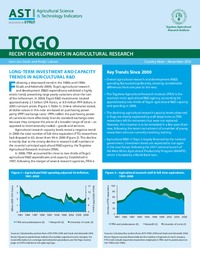Authors:
Stads, Gert-Jan; Labare, Kodjo
Year:
2010
Publisher
International Food Policy Research Institute (IFPRI); and Togolese Agricultural Research Institute (ITRA)
Back to:
In 2008, Togo’s investments in agricultural R&D totaled 2.1 billion CFA francs, or 8.9 million dollars (both in 2005 constant prices), which included all salaries, operating costs, and capital investments. During the past decade, funding for agricultural R&D proved to be very unstable. In the first years of its existence, ITRA was heavily dependent on the support it received from the World Bank through PNASA. Since the closure of this project in 2003, donor contributions account for a very limited share of the funding of Togo’s agricultural R&D. ITRA’s main sources of funding are the grants it receives from the national government as well as the resources it generates internally through the sale of services and of vegetal and animal products.
Agricultural R&D capacity levels decreased by one-third, from 94 FTE researchers in 2000, to 63 in 2008. ITRA’s inability to ensure replacement of its retiring researchers has, in recent years, increased the overall age of its research staff. At ESA the average age of professional staff is much higher still. In an attempt to slow down the ageing of its team of researchers, ITRA recruited about ten young agricultural engineers in 2009, who are to be trained to PhD-degree level over the next few years. While this is a positive development, ITRA will still risk losing its researchers to international organizations and higher-education agencies, as long as the salary gaps fail to decrease and the status of ITRA researchers do not entitle them to the same benefits as those granted to professional staff at the University of Lomé.
The launch of the national component of WAAPP will no doubt temporarily improve the financial situation but, in the long run, the Government of Togo will have to take the necessary steps to consolidate the gains brought by the program. It will have to take responsibility for securing funding for agricultural research so as to avoid the pitfall of fluctuating investment and capacity levels, which have been the predominant feature of Togo’s agricultural research up until now.

